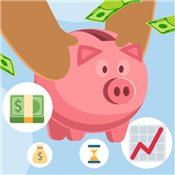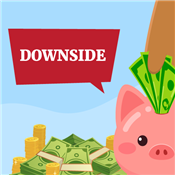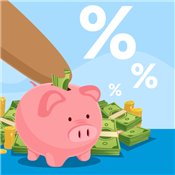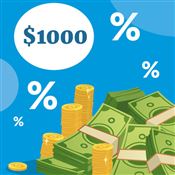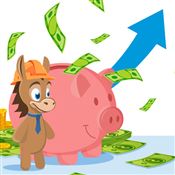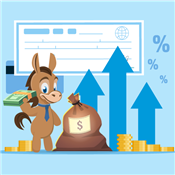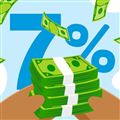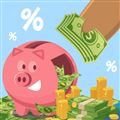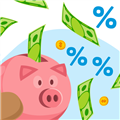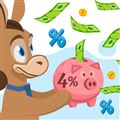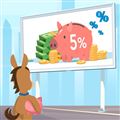Best High Yield Savings Accounts
Ad Disclosure: This article contains references to products from our partners. We may receive compensation if you apply or shop through links in our content. This compensation may impact how and where products appear on this site. You help support CreditDonkey by using our links.
Make your money work harder for you in a high-yield savings account. Here are the top savings accounts to grow your money.
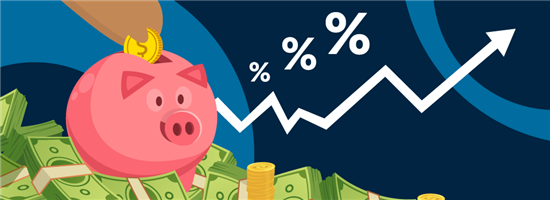 |
CIT Bank Platinum Savings - 3.75% APY
- 3.75% APY with a balance of $5,000 or more
- 0.25% APY with a balance of less than $5,000
- $100 minimum opening deposit
- No monthly maintenance fee
- Member FDIC
If you're looking for a place to set aside extra money, a savings account is an obvious choice.
But not all savings accounts are created equal. Some savings accounts have pesky monthly fees and rock-bottom interest rates.
Enter high-yield savings accounts.
These typically have no maintenance fees and offer APYs that beat the national average of 0.39% (as of February 2026).[1]
Featured Offers
UFB Portfolio Savings - Earn up to 3.26% APY
- Earn up to 3.26% APY.*
- No monthly maintenance fees.
- No minimum deposit required to open an account.
- Access your funds 24/7 with easy-to-use digital banking tools.
- Enjoy peace of mind with FDIC insurance up to the maximum allowance limit – Certificate #35546.
High-Yield Savings Premier - 3.80% APY
- No account fees
- Option to open individual or joint account
- FDIC insured up to $250,000 per depositor
- Only $500 minimum opening deposit
High Yield Savings Account - 3.86% APY
- $1 minimum deposit
- No fees
- 24/7 online access to funds
- FDIC insured
Learn more about the best high-yield savings accounts to keep your money safe. Plus find out what to consider when choosing the right savings account for you.
- Axos ONE:
Earn up to 4.21% APY - Valley National Bank:
High-Yield Savings Account - 3.90% APY - Mission Valley Bank:
High Yield Savings Account - 3.86% APY - Western Alliance Bank:
High-Yield Savings Premier - 3.80% APY - Live Oak Bank:
Personal Savings - Earn 3.80% APY - CIT Bank Platinum Savings:
3.75% APY - Quontic:
High Yield Savings - 3.50% APY - UFB Freedom Checking & Savings:
Unlock Up to 3.46% APY
What is a High-Yield Savings Account?
A high-yield savings account is similar to a regular savings account except it pays better interest—around 8x to 10x more than the national average rate.
You can typically find the best high-yield savings offers at online banks rather than brick-and-mortar institutions. They often have few or no physical branches, allowing them to keep costs down and offer attractive rates.
Overall, high-yield savings accounts are safe and flexible, but keep in mind that interest rates tend to fluctuate over time.
How Do High-Yield Savings Accounts Work?
A high-yield savings account works similarly to a traditional one, but it offers a higher interest rate. Some institutions might require a minimum balance or charge monthly fees, but many don't.
You can also conveniently make withdrawals and deposits, but in-person banking options may vary. Lastly, your money is safe and secure as long as your chosen bank is FDIC-insured.
Glossary
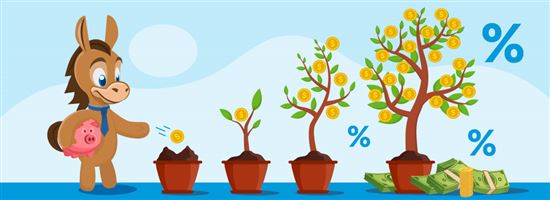 |
Here are some common terms you may encounter when looking at high-yield savings accounts:
- Annual Percent Yield (APY): refers to the interest you can earn in a year, factoring in compound interest.
- Compounding Interest: is when you earn interest on the principal amount and on the interest you've already earned.
- Minimum Deposit Requirement: refers to how much money you need to open an account.
- Monthly Maintenance Fee: is a monthly recurring charge that some banks impose to keep your account open. This can typically be waived if you meet a certain balance.
Why Use a High-Yield Savings Account?
A high-yield savings account is perfect for short-term goals. You can grow your money but still have access when you need it.
Here are some great uses for a high-yield savings account:
- Emergency fund
- House down payment
- Saving for a car
- Special events like a vacation or wedding
- Self-employment taxes
Online banks offer rates as much as 8x or more than traditional big banks. That can be a difference of hundreds—or even thousands—of dollars over the years.
As long as the bank is FDIC insured, your savings are safe. Even if the bank defaults, the government will pay back what is in your account (up to $250,000). High-yield savings accounts are a very secure place to grow your money.
Top High Yield Savings Accounts
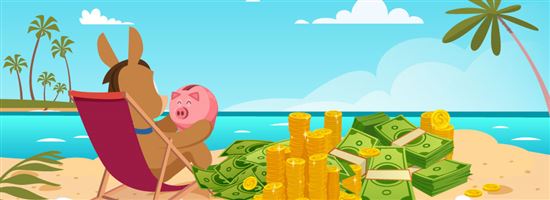 |
Here are some of the highest APY high-yield savings accounts for February 2026:
- Axos ONE:
Earn up to 4.21% APY - Valley National Bank:
High-Yield Savings Account - 3.90% APY - Mission Valley Bank:
High Yield Savings Account - 3.86% APY - Western Alliance Bank:
High-Yield Savings Premier - 3.80% APY - Live Oak Bank:
Personal Savings - Earn 3.80% APY - CIT Bank Platinum Savings:
3.75% APY - Quontic:
High Yield Savings - 3.50% APY - UFB Freedom Checking & Savings:
Unlock Up to 3.46% APY
High Interest: CIT Bank
CIT Bank Platinum Savings - 3.75% APY
- Minimum Deposit to Open: $100
- Monthly Fee: $0
- APY: 3.75% APY with a balance of $5,000 or more
Other Popular High-Yield Savings Accounts
These accounts also offer competitive rates to help you reach your savings goal faster:
Axos ONE - Earn up to 4.21% APY
- Earn up to 4.21% APY* on savings, and 0.51% APY* on checking when you meet requirements.
- Get your money up to 2 days early.
- No monthly maintenance, minimum balance, account opening, or overdraft fees.
High-Yield Savings Account - 3.90% APY
- $1 minimum deposit
- No fees
- 24/7 online access to funds
- FDIC insured
Personal Savings - Earn 3.80% APY
- Earn 3.80% APY
- No minimum balance requirement
- No monthly service fee
High Yield Savings Account - 3.80% APY
- No fees
- $1 minimum deposit
- 24/7 online access
- FDIC insured
CIT Bank Savings Connect - 3.65% APY
- $100 minimum opening deposit
- No monthly maintenance fee
- Member FDIC
High Yield Savings - 3.50% APY
- 3.50% APY
- $100 minimum opening deposit
- No monthly service fees
UFB Freedom Checking & Savings - Unlock Up to 3.46% APY
Combine Freedom Checking with Portfolio Savings to boost your savings APY by up to 0.20%.* Fewer fees, faster transactions. Plus, earn 2.00% APY* on your checking account.
High Yield Savings - Up to 0.61% APY
- 0.61% APY on balance < $25,000
- 0.25% APY on balance $25K-$100K
- 0.15% APY on balance > $100K
- No monthly maintenance fees
- No minimum balance requirements
- $250 minimum opening deposit
- Free incoming wires
- Zero minimum balance requirement
Empower Personal Cash
- 3.00% APY
- $0 monthly fee
- Withdraw up to $100k per day
What to Look For in a High Yield Savings Account
- Minimum opening deposit
- Balance requirements
- Monthly service fee
- APY rate
- How often rates change
- How often a bank's offerings change
- Withdrawal options
- Account options
Required opening deposit
If you're just starting to build your savings, look for an account with no minimum deposit. You can slowly add to it without needing much money upfront.
Balance requirements
Some accounts have a minimum daily balance or monthly deposit requirements. You might not get the highest APY possible if you don't meet it.
Monthly service fee
Most of the banks on our list have no monthly service fee. But a couple do require a minimum daily balance to avoid a service fee.
APY rate
Look for the highest APY rate on the account with requirements you can satisfy. A higher APY will help you grow your money faster.
Imagine two banks with APYs of 2.20% and 2.40%. If you only have $1,000 to save, that's a difference of just cents over a year. But if you have $50,000, that's a difference of $100 every year.
How often rates change
The Federal Reserve Board meets every 3 to 6 months to consider interest rate changes, and banks will often adapt their rates accordingly.
But some banks only offer high APYs to attract new customers, then drop their rates within 6 months to a year. We avoided those banks.
How often a bank's offerings change
Financial institutions can change their features anytime, but we looked for banks with a reputation for top-notch services over the long haul.
Withdrawal options
Before April 24, 2020, federal law stated you couldn't make more than 6 withdrawals from your high-interest savings account per month. This includes transfers between accounts, online payments, and overdraft fees.
But the Federal Reserve changed that during the pandemic and now allows unlimited withdrawals.
Today, most banks still enforce the 6 withdrawals per month limit. Although Ally Bank will temporarily refund the $10 fee they charge, if you exceed this limit.
Cynthia Flannigan, CFP®, MainStreet Financial Planning
Account options
Aside from a high-interest rate, the best banks have other account options as well.
- Physical branches or online only: Some online savings accounts offer great rates, but you could never deposit or withdraw money from a physical branch.
- ATM locations: If you don't need access to an ATM, then you could find an account with higher rates. You can also look for a money market account to open up your options.
- Customer support: Banks like Ally have built a reputation for 24/7 customer service, which can be helpful if you run into problems.
- Easy-to-use app: If their app isn't convenient, this could make a bank worthless since you can't monitor your account.
- Checking: Some online banks only offer savings accounts, so you'll need to choose a full-service bank if you also want a checking account.
A money market account is similar to a savings account. But some offer flexible features like check writing or ATM access. Your funds are more fluid, though you're still limited to 6 withdrawals per month.
A CD requires you to deposit an amount of money for a fixed term. Sometimes, it may offer a higher interest rate for your commitment—more on CDs below.
Advantages of a High-Yield Savings Account
A high-yield savings account gives you a safe place to grow your money. Some of the benefits are:
Security
Your deposits are FDIC secured, which means that you're protected (up to $250,000) if the bank defaults.[2]
Guaranteed returns
Unlike investing in stocks or bonds, your savings have reliable returns and no risk. However, the APY can change according to the market—you'll always earn the current advertised rate.
Flexibility
You can transfer money in and out to access your savings when you need it. Federal regulation allows up to 6 withdrawals or transfers per statement cycle without penalty.[3]
Yes. The interest you earn is treated as income. You will have to report it on your tax return every year. You will be taxed on it at your ordinary income tax bracket.
How to Open A High-Yield Savings Account
Opening a high-yield savings account is relatively easy, especially when you do it online. Just follow these steps:
- Browse through high-yield savings options.
Since many high-yield savings accounts are being offered today, the practical thing to do is to browse through your options before deciding. You can typically find the best rates at online banks or credit unions. - Fill-out the application form.
Once you've decided, just answer the account application form which is usually found on the bank's website. You would also need to provide your personal information (name, birth date, address, SSN, etc) and a government ID. - Submit and fund your account.
Finally, submit your application and fund your account. If there's no minimum deposit requirement, you can add money whenever you want, but be mindful of specific grace periods.
Axos ONE - Earn up to 4.21% APY
- Earn up to 4.21% APY* on savings, and 0.51% APY* on checking when you meet requirements.
- Get your money up to 2 days early.
- No monthly maintenance, minimum balance, account opening, or overdraft fees.
High-Yield Savings Account - 3.90% APY
- $1 minimum deposit
- No fees
- 24/7 online access to funds
- FDIC insured
High Yield Savings Account - 3.86% APY
- $1 minimum deposit
- No fees
- 24/7 online access to funds
- FDIC insured
High-Yield Savings Premier - 3.80% APY
- No account fees
- Option to open individual or joint account
- FDIC insured up to $250,000 per depositor
- Only $500 minimum opening deposit
Personal Savings - Earn 3.80% APY
- Earn 3.80% APY
- No minimum balance requirement
- No monthly service fee
High Yield Savings Account - 3.80% APY
- No fees
- $1 minimum deposit
- 24/7 online access
- FDIC insured
CIT Bank Platinum Savings - 3.75% APY
- 3.75% APY with a balance of $5,000 or more
- 0.25% APY with a balance of less than $5,000
- $100 minimum opening deposit
- No monthly maintenance fee
- Member FDIC
CIT Bank Savings Connect - 3.65% APY
- $100 minimum opening deposit
- No monthly maintenance fee
- Member FDIC
High Yield Savings - 3.50% APY
- 3.50% APY
- $100 minimum opening deposit
- No monthly service fees
UFB Freedom Checking & Savings - Unlock Up to 3.46% APY
Combine Freedom Checking with Portfolio Savings to boost your savings APY by up to 0.20%.* Fewer fees, faster transactions. Plus, earn 2.00% APY* on your checking account.
What Experts Say
CreditDonkey assembled multiple industry experts to answer readers' most pressing questions:
- Why are people still using traditional banks?
- Are online banks safe?
- How do you stay calm during financial stress?
Here's what they said:
High-Yield Savings Alternatives
If you're undecided about getting a high-yield savings account, here are some alternative options for you to explore:
Certificate of Deposit
A certificate of deposit (CD) requires you to lock up your money for a certain period. To reward you for tying up your funds, you'll get a fixed rate that may be higher than a savings account.
However, you can't withdraw your funds before the term ends or you'll face a penalty. Hence, CDs tend to be better for those with long-term savings goals (1-10 years).
CD laddering is when you divide your deposits into multiple CDs with different rates and maturity dates. For example, your ladder might look like this:
- $1,000 in a 1-year CD at 2.30%
- $1,000 in a 3-year CD at 2.70%
- $1,000 in a 5-year CD at 2.90%
As each CD matures, you can withdraw the funds (plus interest) and re-invest them in a 5-year CD. This is a very smart strategy. This way, every year, you can withdraw money if you need it. And you can always get the best current interest rate.
- Raisin:
High-Yield CD - Up to $1,500 Bonus - Western Alliance Bank:
3-Month High-Yield CD - 4.00% APY - Mission Valley Bank CD Rates:
Up to 3.80% APY - Quontic:
CD Rates - Up to 3.75% APY - CIT Bank No Penalty CD:
3.75% APY - Sallie Mae Bank CD Rates:
Up to 3.50% APY
Money Market Account
A money market account lets you earn a good APY on your balance. Others even provide easy access to your funds through wire transfers, check-writing privileges, and a debit card.
Just note that some banks require an initial deposit or a specific balance to maintain.
- UFB Portfolio Money Market:
Earn up to 3.26% APY
Checking Account
If you need frequent access to your funds, a checking account could be a more suitable choice. It often comes with a debit card and online banking features, meaning your money is always within reach.
Additionally, high-yield checking account options are available for those who want to earn interest on their balance.
- Bank of America Advantage Banking:
Up to $500 Cash Offer - HSBC Premier:
Earn Up to $7,000 - Wells Fargo Everyday Checking Account:
$325 Bonus - Chase Total Checking®:
$400 Bonus - U.S. Bank Business Essentials:
$400 Bonus - Bluevine:
Free Business Checking - Earn $500 Bonus - KeyBank:
Key Select Checking® - $500 Bonus - Axos Bank:
Basic Business Checking - Up to $200 Bonus - Relay:
25% Discount on Scale Plan
Traditional Savings
If you value in-person banking and aren't concerned about earning high interest rates, opting for a traditional savings account might be better for you. Many physical banks provide this option, giving you a range of choices to consider.
Methodology
To come up with our list of the best savings accounts for high-interest rates, we not only paid attention to the annual percentage yield, but also looked at:
- Minimum deposits: Some banks only offer high-interest rates to accounts with larger balances. But on this list, you'll find options starting as low as $100.
- Fees: A high-interest rate won't help if you lose money in overdraft or monthly maintenance fees, so we looked for accounts with the lowest fee structures.
- User friendliness: It's important to have a bank that can integrate with your life, so you can easily deposit money and watch it grow.
- Miscellaneous features: You'll find banks offering a full range of features on this list.
Bottom Line
A high-yield savings account is one of the best vehicles for growing your money safely. With so many banks competing for your business, there's no reason to stick with a traditional bank's nearly non-existent rates.
CIT Bank Platinum Savings - 3.75% APY
- 3.75% APY with a balance of $5,000 or more
- 0.25% APY with a balance of less than $5,000
- $100 minimum opening deposit
- No monthly maintenance fee
- Member FDIC
UFB Portfolio Savings - Earn up to 3.26% APY
- Earn up to 3.26% APY.*
- No monthly maintenance fees.
- No minimum deposit required to open an account.
- Access your funds 24/7 with easy-to-use digital banking tools.
- Enjoy peace of mind with FDIC insurance up to the maximum allowance limit – Certificate #35546.
High-Yield Savings Premier - 3.80% APY
- No account fees
- Option to open individual or joint account
- FDIC insured up to $250,000 per depositor
- Only $500 minimum opening deposit
Of course, there are some downsides. Online banks don't have physical branches for in-person support. If you need help for any reason, you'll have to contact customer service online or over the phone.
Still, for the higher rates, it's a great alternative to grow your money faster.
Additional Resources
References
- ^ FDIC. National Rates and Rate Caps
- ^ FDIC. Deposit Insurance, Retrieved 12/29/2023
- ^ Federal Reserve Board. Regulation D Reserve Requirements, Retrieved 12/29/2023
- ^ Federal Reserve Board. "announces interim final rule to delete the six-per-month limit", Retrieved 12/29/2023
- ^ IRS. Topic No. 403 Interest Received, Retrieved 12/29/2023
Donna Tang is a content associate at CreditDonkey, a bank comparison and reviews website. Write to Donna Tang at donna.tang@creditdonkey.com. Follow us on Twitter and Facebook for our latest posts.
Note: This website is made possible through financial relationships with some of the products and services mentioned on this site. We may receive compensation if you shop through links in our content. You do not have to use our links, but you help support CreditDonkey if you do.










